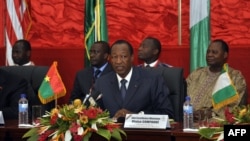Interim Malian Prime Minister Cheick Modibo Diarra Tuesday presented the roadmap for returning the country to civilian rule to Burkina Faso President Blaise Campaore, the chief mediator of the Economic Community of West African States (ECOWAS).
Hamadoune Toure, Mali’s minister for communication and government spokesman said the plan includes the formation of a broad-based government and a plan to regain control of the country’s north from hardline Islamists and rebel groups.
"The roadmap shows the way to two main issues," he said. "The first one is how to get rid of terrorists and traffickers from the north of the country. The second one is how to hold fair, free and credible elections throughout the country, so as to give power to an elected government after the transition."
The sub-regional group ECOWAS has demanded the formation of a unity government to pave the way for a return to constitutional rule.
Toure said Diarra assured Campaore of the transitional government’s readiness to include most stakeholders from the Malian political spectrum.
"The prime minister expressed his readiness to open the government to other partners, including civil society, political actors, and other actors who can come, join the government and mobilize the whole country," Toure said.
ECOWAS wants to send a 3,000-strong military force to Mali, but said it is awaiting UN approval and a formal request from Bamako.
Toure said Mali would welcome the regional troops to get rid of hardline Islamists and what he called “drug traffickers” in the north of the country.
He said ECOWAS military experts are already in the country to assess the military situation.
“We have a group of ECOWAS military officers who are working with their Malian counterparts to plan, to organize, to see what is needed so that we can express a request to ECOWAS countries, to African Union member states and to the international community through the United Nations Security Council,” Toure said.
Toure said the one-year transitional process, which began the day when Diarra was appointed on April 17, is expected to conclude April 2013.
Hamadoune Toure, Mali’s minister for communication and government spokesman said the plan includes the formation of a broad-based government and a plan to regain control of the country’s north from hardline Islamists and rebel groups.
"The roadmap shows the way to two main issues," he said. "The first one is how to get rid of terrorists and traffickers from the north of the country. The second one is how to hold fair, free and credible elections throughout the country, so as to give power to an elected government after the transition."
The sub-regional group ECOWAS has demanded the formation of a unity government to pave the way for a return to constitutional rule.
Toure said Diarra assured Campaore of the transitional government’s readiness to include most stakeholders from the Malian political spectrum.
"The prime minister expressed his readiness to open the government to other partners, including civil society, political actors, and other actors who can come, join the government and mobilize the whole country," Toure said.
ECOWAS wants to send a 3,000-strong military force to Mali, but said it is awaiting UN approval and a formal request from Bamako.
Toure said Mali would welcome the regional troops to get rid of hardline Islamists and what he called “drug traffickers” in the north of the country.
He said ECOWAS military experts are already in the country to assess the military situation.
“We have a group of ECOWAS military officers who are working with their Malian counterparts to plan, to organize, to see what is needed so that we can express a request to ECOWAS countries, to African Union member states and to the international community through the United Nations Security Council,” Toure said.
Toure said the one-year transitional process, which began the day when Diarra was appointed on April 17, is expected to conclude April 2013.






